外研版八年级英语上册课件 Module 11 Way of life Unit 1 (共22张PPT)
文档属性
| 名称 | 外研版八年级英语上册课件 Module 11 Way of life Unit 1 (共22张PPT) | 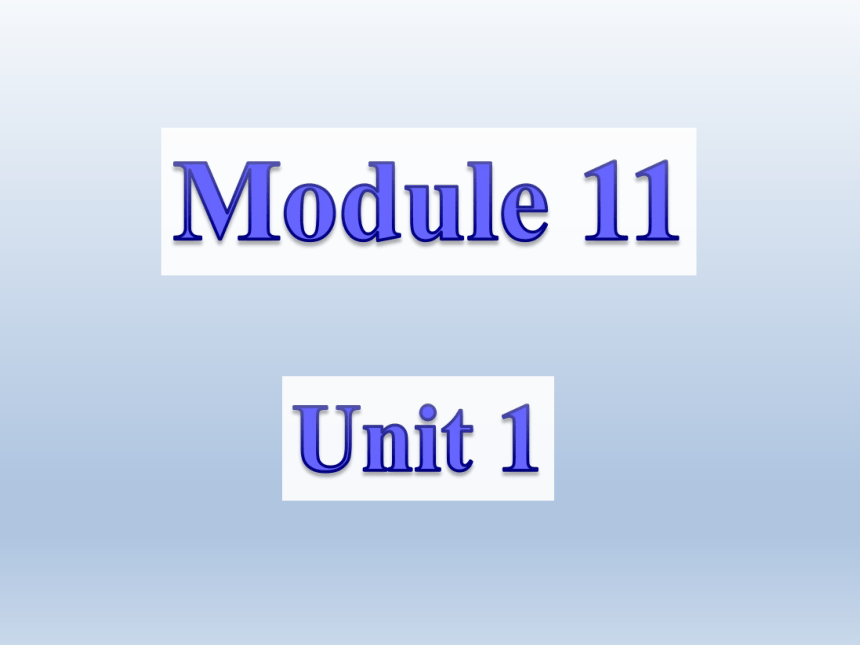 | |
| 格式 | ppt | ||
| 文件大小 | 757.5KB | ||
| 资源类型 | 教案 | ||
| 版本资源 | 外研版 | ||
| 科目 | 英语 | ||
| 更新时间 | 2022-08-03 14:31:02 | ||
图片预览

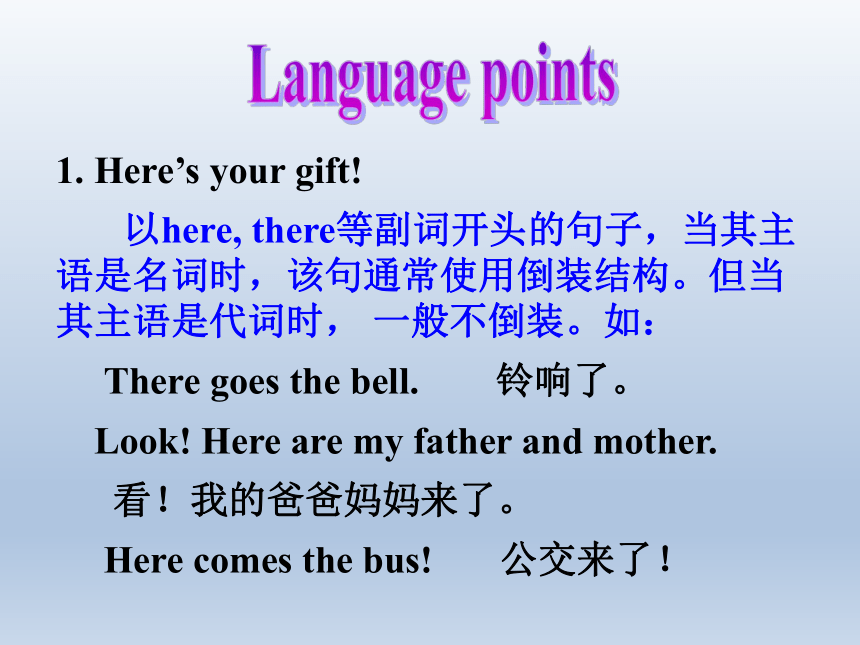
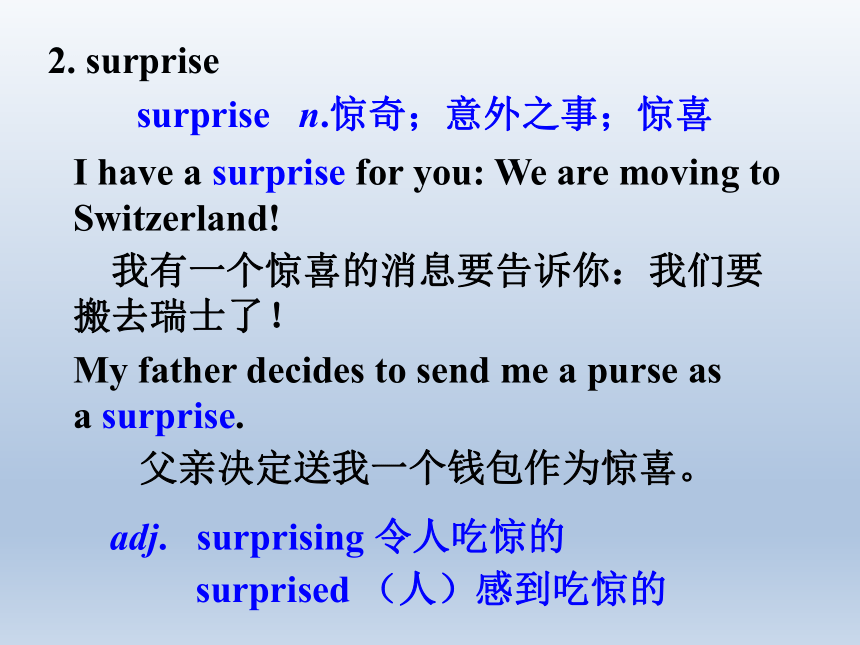

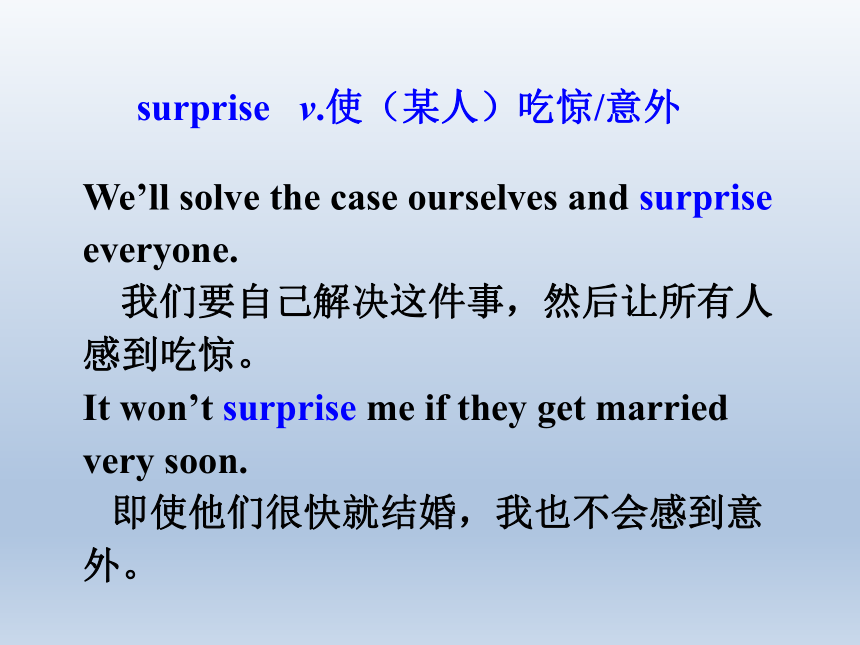

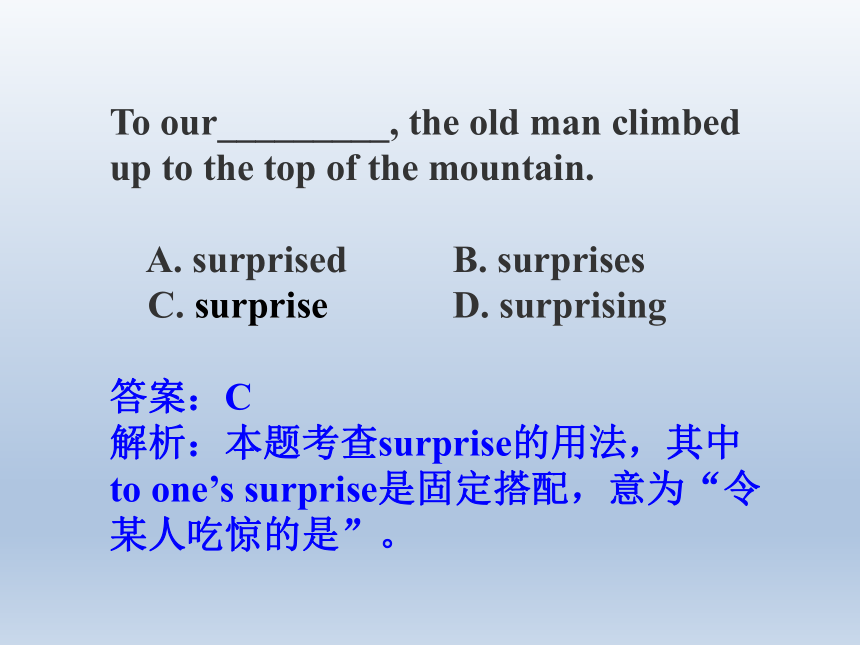
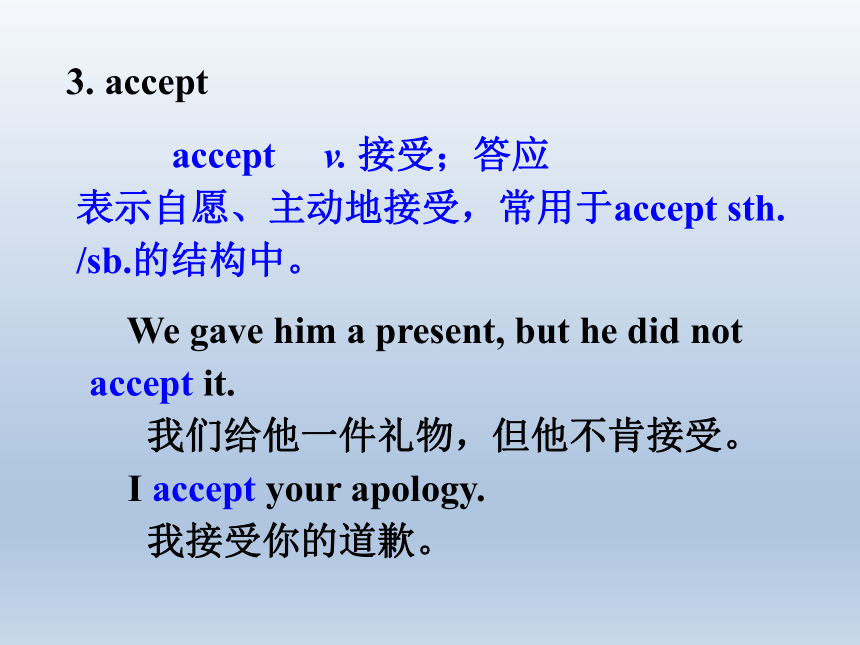
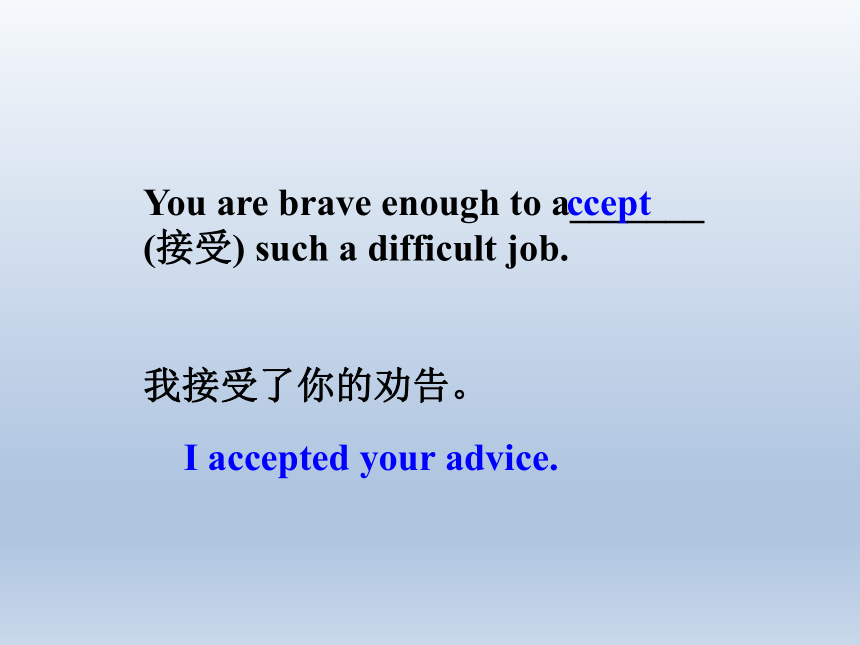
文档简介
(共22张PPT)
1. Here’s your gift!
以here, there等副词开头的句子,当其主语是名词时,该句通常使用倒装结构。但当其主语是代词时, 一般不倒装。如:
There goes the bell. 铃响了。
Look! Here are my father and mother.
看!我的爸爸妈妈来了。
Here comes the bus! 公交来了!
2. surprise
surprise n.惊奇;意外之事;惊喜
I have a surprise for you: We are moving to Switzerland!
我有一个惊喜的消息要告诉你:我们要搬去瑞士了!
My father decides to send me a purse as a surprise.
父亲决定送我一个钱包作为惊喜。
adj. surprising 令人吃惊的
surprised (人)感到吃惊的
What a surprise! 好惊讶!
这是一个感叹句。英语中的干套句通常以what和how开头,what修饰名词,how 修饰形容词、副词或动词。
What a smart boy he is!
多聪明的男孩啊!
How kind you are!
你人真好!
surprise v.使(某人)吃惊/意外
We’ll solve the case ourselves and surprise everyone.
我们要自己解决这件事,然后让所有人感到吃惊。
It won’t surprise me if they get married very soon.
即使他们很快就结婚,我也不会感到意外。
相关拓展
in surprise
by surprise
to one’s surprise
What a surprise!
It surprised sb. that ...
吃惊地
出其不意地;猝不及防地
令某人吃惊的是
真令人吃惊!/真是个惊喜!
令人吃惊的是...
To our_________, the old man climbed up to the top of the mountain.
A. surprised B. surprises
C. surprise D. surprising
答案:C
解析:本题考查surprise的用法,其中to one’s surprise是固定搭配,意为“令某人吃惊的是”。
3. accept
accept v. 接受;答应
表示自愿、主动地接受,常用于accept sth. /sb.的结构中。
We gave him a present, but he did not
accept it.
我们给他一件礼物,但他不肯接受。
I accept your apology.
我接受你的道歉。
You are brave enough to a_______ (接受) such a difficult job.
我接受了你的劝告。
ccept
I accepted your advice.
[拓展]
accept的反义词是refuse
refuse v. 拒绝,回绝
常用于refuse sth. / to do sth.结构。
I refuse to answer that question.
我不愿回答那个问题。
[辨析] receive和accept
receive:“收到”,表示客观的情况
accept:“接受”,表示主观的情况
accept a gift:表示接受礼物
receive a gift:只是收到礼物,但不一定接受。
He received a gift, but he didn’t accept it.
他收到了一件礼物,但他没有接受。
1. 她非常愉快地接受了邀请。
She was very glad to _______ the invitation.
2. 昨天我接到一份参加晚会的邀请,但我拒绝了接受它。
I ________ an invitation to the party yesterday, but I refused to ________ it.
3.我们很久没有收到他的来信了。
We haven’t ________ his letter for a long time.
accept
received
accept
received
用 receive 或 accept 填空 :
He __________ a present yesterday, but
he didn’t ________ it, because it was too expensive and he sent it back.
2. I _________ his letter yesterday.
3. He didn’t ________ my suggestion.
4. She _________ a good education.
received
accept
received
accept
received
4. do some cleaning
do some cleaning 清洁;打扫卫生
I usually do some cleaning on Sunday.
周日我通常打扫卫生。
类似结构的短语还有:
do some washing 洗衣服
do some reading 读书
do some cooking 做饭
do some writing 写字
do some shopping 购物
5. had better
had better (do sth.) 意为“最好……”,表示劝告或建议。如:
You had better have another think.
你最好再想一想。
You had better eat more fruit and vegetables.
你最好多吃些水果和蔬菜。
否定形式: had better not do sth.
你今天最好待在那儿。 You _____ _____ ______ there today.
你最好不要在早饭时间去看他。
You ______ ____ _______ ______ to see him at breakfast time.
had better not go
had better stay
6. You can’t be serious! 你不会是认真的吧!
/你一定是开玩笑吧!
-- I will marry Mike next week.
我下星期要和迈克结婚。
-- You can’t be serious. You have only known
him for two months.
你不是认真的吧,你才认识他两个月呀。
-- I’m going to a party on Thursday night at Jimmy’s house.
-- _________! You’ll have two tests at school on Friday.
A. It's easy to say so
B. That's exciting
C. Enjoy yourself
D. You can't be serious
【解析】由于后一句“有考试”,这里不能回答“玩得开心”;You can’ be serious!意思是“你一定是开玩笑吧!”。
D
— Chris has learnt English for only
three months.
—________! His English is so good.
A. He got it
B. Believe it or not
C. I can’t agree more
D. You can’t be serious
D
serious在这里的意思是“认真的;不开玩笑的”
I was serious in what I said at dinner.
我吃饭时说的那番话是认真的。
Let’s have a serious talk about your future.
让我们认真谈一谈你的未来。
He was serious about the matter.
他对于那件事很认真。
It is Lingling’s birthday. Her friends have got her a __________. Tony asks her to open it at once, but Lingling can’t. This is because the Chinese __________ are different from those of the USA. The Chinese must _________ and open it later.
Complete the passage.
gift
customs
wait
Daming also tells his friends some other customs in China. When people ________ a gift, they must use both hands. But in the West people don’t pay much attention to that. And people must use red paper for hongbao because it’s _________. Anything else The Chinese mustn’t do any _________ on the first day of the Chinese New Year. And they can’t ________ their hair. They mustn’t _______ anything because it’s bad luck. The Chinese eat lots of jiaozi in the North.
accept
lucky
cleaning
cut
break
1. Here’s your gift!
以here, there等副词开头的句子,当其主语是名词时,该句通常使用倒装结构。但当其主语是代词时, 一般不倒装。如:
There goes the bell. 铃响了。
Look! Here are my father and mother.
看!我的爸爸妈妈来了。
Here comes the bus! 公交来了!
2. surprise
surprise n.惊奇;意外之事;惊喜
I have a surprise for you: We are moving to Switzerland!
我有一个惊喜的消息要告诉你:我们要搬去瑞士了!
My father decides to send me a purse as a surprise.
父亲决定送我一个钱包作为惊喜。
adj. surprising 令人吃惊的
surprised (人)感到吃惊的
What a surprise! 好惊讶!
这是一个感叹句。英语中的干套句通常以what和how开头,what修饰名词,how 修饰形容词、副词或动词。
What a smart boy he is!
多聪明的男孩啊!
How kind you are!
你人真好!
surprise v.使(某人)吃惊/意外
We’ll solve the case ourselves and surprise everyone.
我们要自己解决这件事,然后让所有人感到吃惊。
It won’t surprise me if they get married very soon.
即使他们很快就结婚,我也不会感到意外。
相关拓展
in surprise
by surprise
to one’s surprise
What a surprise!
It surprised sb. that ...
吃惊地
出其不意地;猝不及防地
令某人吃惊的是
真令人吃惊!/真是个惊喜!
令人吃惊的是...
To our_________, the old man climbed up to the top of the mountain.
A. surprised B. surprises
C. surprise D. surprising
答案:C
解析:本题考查surprise的用法,其中to one’s surprise是固定搭配,意为“令某人吃惊的是”。
3. accept
accept v. 接受;答应
表示自愿、主动地接受,常用于accept sth. /sb.的结构中。
We gave him a present, but he did not
accept it.
我们给他一件礼物,但他不肯接受。
I accept your apology.
我接受你的道歉。
You are brave enough to a_______ (接受) such a difficult job.
我接受了你的劝告。
ccept
I accepted your advice.
[拓展]
accept的反义词是refuse
refuse v. 拒绝,回绝
常用于refuse sth. / to do sth.结构。
I refuse to answer that question.
我不愿回答那个问题。
[辨析] receive和accept
receive:“收到”,表示客观的情况
accept:“接受”,表示主观的情况
accept a gift:表示接受礼物
receive a gift:只是收到礼物,但不一定接受。
He received a gift, but he didn’t accept it.
他收到了一件礼物,但他没有接受。
1. 她非常愉快地接受了邀请。
She was very glad to _______ the invitation.
2. 昨天我接到一份参加晚会的邀请,但我拒绝了接受它。
I ________ an invitation to the party yesterday, but I refused to ________ it.
3.我们很久没有收到他的来信了。
We haven’t ________ his letter for a long time.
accept
received
accept
received
用 receive 或 accept 填空 :
He __________ a present yesterday, but
he didn’t ________ it, because it was too expensive and he sent it back.
2. I _________ his letter yesterday.
3. He didn’t ________ my suggestion.
4. She _________ a good education.
received
accept
received
accept
received
4. do some cleaning
do some cleaning 清洁;打扫卫生
I usually do some cleaning on Sunday.
周日我通常打扫卫生。
类似结构的短语还有:
do some washing 洗衣服
do some reading 读书
do some cooking 做饭
do some writing 写字
do some shopping 购物
5. had better
had better (do sth.) 意为“最好……”,表示劝告或建议。如:
You had better have another think.
你最好再想一想。
You had better eat more fruit and vegetables.
你最好多吃些水果和蔬菜。
否定形式: had better not do sth.
你今天最好待在那儿。 You _____ _____ ______ there today.
你最好不要在早饭时间去看他。
You ______ ____ _______ ______ to see him at breakfast time.
had better not go
had better stay
6. You can’t be serious! 你不会是认真的吧!
/你一定是开玩笑吧!
-- I will marry Mike next week.
我下星期要和迈克结婚。
-- You can’t be serious. You have only known
him for two months.
你不是认真的吧,你才认识他两个月呀。
-- I’m going to a party on Thursday night at Jimmy’s house.
-- _________! You’ll have two tests at school on Friday.
A. It's easy to say so
B. That's exciting
C. Enjoy yourself
D. You can't be serious
【解析】由于后一句“有考试”,这里不能回答“玩得开心”;You can’ be serious!意思是“你一定是开玩笑吧!”。
D
— Chris has learnt English for only
three months.
—________! His English is so good.
A. He got it
B. Believe it or not
C. I can’t agree more
D. You can’t be serious
D
serious在这里的意思是“认真的;不开玩笑的”
I was serious in what I said at dinner.
我吃饭时说的那番话是认真的。
Let’s have a serious talk about your future.
让我们认真谈一谈你的未来。
He was serious about the matter.
他对于那件事很认真。
It is Lingling’s birthday. Her friends have got her a __________. Tony asks her to open it at once, but Lingling can’t. This is because the Chinese __________ are different from those of the USA. The Chinese must _________ and open it later.
Complete the passage.
gift
customs
wait
Daming also tells his friends some other customs in China. When people ________ a gift, they must use both hands. But in the West people don’t pay much attention to that. And people must use red paper for hongbao because it’s _________. Anything else The Chinese mustn’t do any _________ on the first day of the Chinese New Year. And they can’t ________ their hair. They mustn’t _______ anything because it’s bad luck. The Chinese eat lots of jiaozi in the North.
accept
lucky
cleaning
cut
break
同课章节目录
- Module 1 How to learn English
- Unit 1 Let's try to speak English as much as possi
- Unit 2 You should smile at her.
- Unit 3 Language in use .
- Module 2 My home town and my country
- Unit 1 It's taller than many other buildings.
- Unit 2 Cambridge is a beautiful city in the east o
- Unit 3 Language in use .
- Module 3 Sports.
- Unit 1 Nothing is more exciting than playing tenni
- Unit 2 This year we training more carefully.
- Unit 3 Language in use .
- Module 4 Planes, ships and trains .
- Unit 1 He lives the farthest from school.
- Unit 2 What is the best way to travel.
- Unit 3 Language in use .
- Module 5 Lao She Teahouse.
- Unit 1 I wanted to see the Beijing Opera.
- Unit 2 It descibes the changes in Chinese society.
- Unit 3 Language in use .
- Module 6 Animals in danger.
- Unit 1 It allows people to get closer to them .
- Unit 2 The WWF is working hard to save them all.
- Unit 3 Language in use .
- Revision module A
- Module 7 A famous story
- Unit 1 Alice was sitting with her sister by the ri
- Unit 2 She was thinking about her cat.
- Unit 3 Language in use .
- Module 8 Accidents
- Unit 1 While the car were changing to red, a car s
- Unit 2 I was trying to pick it up when it bite me
- Unit 3 Language in use .
- Module 9 Population
- Unit 1 The population of China is about 1.37 billi
- Unit 2 Arnwick was a city with 200,000 people.
- Unit 3 Language in use .
- Module 10 The weathe
- Unit 1 It might snow.
- Unit 2 The weather is fine all year round.
- Unit 3 Language in use .
- Module 11 Way of life
- Unit 1 In China ,we open a gift later.
- Unit 2 In England, you usually drink tea with milk
- Unit 3 Language in use .
- Module 12 Help
- Unit 1 What should we do before help arrives?
- Unit 2 Stay away from windows and heavy furniture.
- Unit 3 Language in use .
- Revision module B
